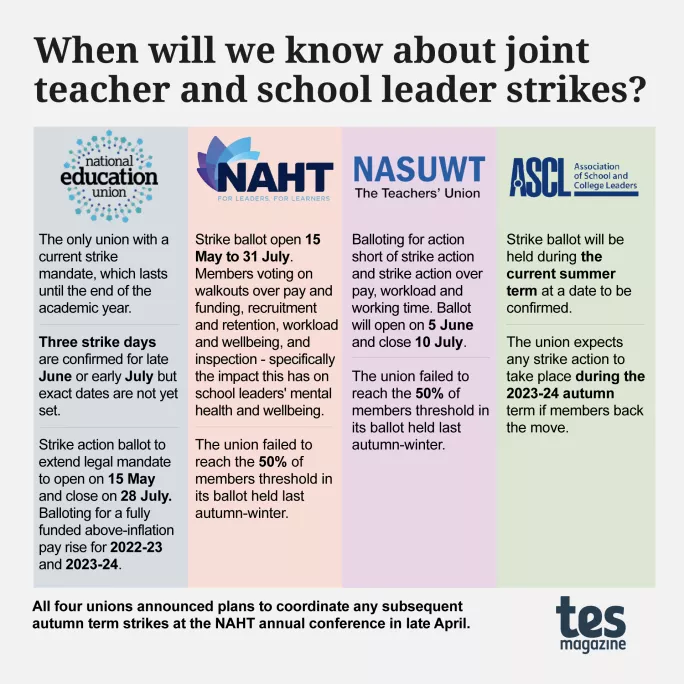Education unions have urged the government to return to the negotiating table over pay as two strike ballots were launched today.
The NAHT school leaders’ union will ballot members for strike action over pay, funding and inspection, as well as recruitment and retention, workload and wellbeing.
Meanwhile, NEU teaching union members will be balloted for strike action seeking a fully funded above-inflation pay rise for both 2022-23 and 2023-24.
If members vote for strike action, both unions would be able to carry out action into the spring term of next year.
While the NEU already has a legal mandate for strike action after a previous ballot, this only runs until mid-July, meaning any future action will need to be agreed by members.
Its ballot, which opens on 15 May and closes on 28 July, will ask members if they are prepared to take part in strike action in furtherance of the dispute.
The NAHT’s ballot will also open today and close on 31 July, with the results to be announced soon after.
Threat of teachers’ and heads’ strikes in the autumn
Meanwhile, the NASUWT teaching union will launch its ballot on action short of strike action and strike action over pay, workload and working time on 5 June, with voting to close on 10 July.
The Association of School and College Leaders will also ballot members on strike action this term, but the dates have not yet been announced.
After a period of intensive talks in March, the Department for Education made all four teaching unions the offer of a £1,000 non-consolidated payment for 2022-23 and an average 4.5 per cent rise for 2023-24.
But school leaders voiced concerns about the affordability of the government offer after it was revealed that just 0.5 per cent of the overall 4.5 per cent pay award for next year, plus the £1,000 one-off payment for this year, would come through new funding.
All four education unions rejected the pay offer from the government.
Commenting today, Dr Mary Bousted and Kevin Courtney, joint general secretaries of the NEU, said the union had been “put in the position of re-balloting its members” because of the “lack of engagement from government”.
“The pay and funding offer made by [education secretary] Gillian Keegan following six days of talks in March was simply not good enough, and teachers branded it an ‘insult’,” Dr Bousted and Mr Courtney said.
“With four education unions balloting members for strike action in the autumn term, this should be a wake-up call. Our re-ballot would allow the NEU to coordinate action with other teacher unions in the autumn term if government does not provide a settlement to the dispute. It is never too late for the education secretary to come to the negotiating table and make an improved offer.”
NAHT general secretary Paul Whiteman said: “After our members overwhelmingly rejected the previous inadequate offer, which was not properly funded, we appealed to the government to get back around the table.
“So far we have had no further meaningful talks, and instead the government has dropped its offer of a £1,000 cost-of-living payment as an apparent punishment for not accepting its deal.
“We have been left with no other choice but to seek this mandate for industrial action.”
Mr Whiteman said that “nobody working in education wants to have to go on strike” but he added that it seemed “the only way to open the government’s eyes to the mess our education system is in, and the recruitment and retention crisis fuelled by years of real-terms pay and funding cuts, unsustainable workload and high-stakes inspections which harm staff wellbeing”.
The DfE has been approached for comment.





